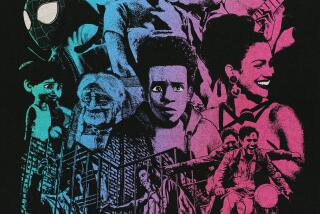‘HOOLIGANS’ OPENS SAURA TRIBUTE
- Share via
“The Films of Carlos Saura,” a retrospective in honor of Spain’s leading director, begins tonight at 8 at UCLA Melnitz with “The Hooligans” (1959), Saura’s first feature film--and the first of many of his films in the series never released in America.
Shot in the Neo-Realist style in a black and white so exquisitely modulated as to take your breath away, it remains a stunner. Saura used non-professionals to tell a classic story of a group of Madrid youths surviving on petty thievery. Although predatory and vicious, they are not truly aimless but in fact striving to gather among themselves enough money to launch one of their friends as a bullfighter. (Bullfighting, of course, represents to Spanish youths an escape from poverty as much as boxing does to their American counterparts.)
That these young men can be so concerned about each other yet so ruthless in their thievery gives them a challenging, disturbing dimension. A landmark in Spanish cinema for its break with the usual escapist fare of the Franco regime, “The Hooligans” has something of the rigorous detachment of Agnes Varda’s current “Vagabond.”
Playing with “The Hooligans” is “The Hunt” (1965). Four men, all friends and former Falangists, go on a rabbit hunt, which as it progresses becomes an implicit and bitter commentary on life under Franco.
“The New Spanish Cinema,” which is being presented in conjunction with the Saura retrospective, continues Friday at 8 with “Be Unfaithful and Don’t Be Ashamed” (1985) an amusing, old-fashioned farce involving secret doors and multiple marital infidelities. It was adapted by its energetic director Fernando Trueba from the Ray Cooney-John Chapman play “Move On, Mrs. Markham.”
One of its stars, Carmen Maura, cast as a rich, aggressively unfaithful wife, also stars in the second feature, Pedro Almodovar’s “What Have I Done to Deserve This?” (1984)--as the downtrodden spouse of a taxi driver.
Saturday’s double feature, also beginning at 8 p.m., is composed of Jaime Chavarri’s “Bicycles Are for Summer” (1984) and Saura’s best-known film, the Oscar-nominated “Carmen.” The Chavarri film, skillfully adapted by Andres Vicente Gomez from a play by noted veteran actor Fernando Fernan Gomez, is a familiar and sentimental but beautifully made and deeply felt coming of age story, which gives the best idea yet of what daily life was like for the average citizen during the Spanish Civil War. It centers on a nice, solid family representing the mainstream Spaniards caught cruelly between the political and military fluctuations of the extreme left and the extreme right.
Also continuing at UCLA Melnitz on Thursdays at 6 p.m. is “MGM: The Silent Twenties,” a treasure-trove of rarities. The Fatty Arbuckle-directed “Red Mill” (1927) starring Marion Davies screens at 6 p.m., followed at 8 by Rex Ingram’s “Scaramouche” (1923), with Ramon Novarro. The hilarious and enchanting “Exit Smiling” (1926) stars a peerless Beatrice Lillie as a stage-struck stock company drudge. Phones: (213) 825-2345, 825-2581.
More to Read
Only good movies
Get the Indie Focus newsletter, Mark Olsen's weekly guide to the world of cinema.
You may occasionally receive promotional content from the Los Angeles Times.







